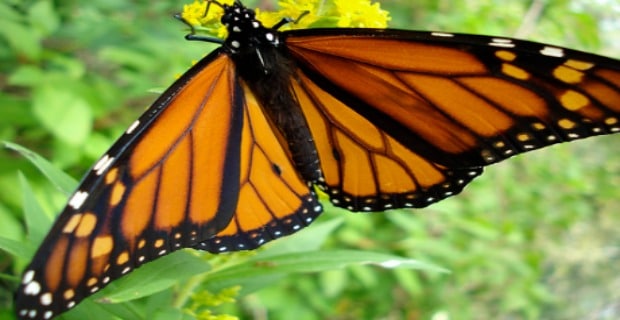

Monarch butterflies are beautiful and revered creatures in North America. The amazing insects travel up to 2,800 miles in a two-month long journey from Canada and the U.S. to central Mexico where they hibernate for the winter. It’s the second longest migration of all known insects, according to the World Wildlife Fund (WWF). The monarch butterfly is the official state butterfly of Minnesota and is the official insect or butterfly of sixth other states in the U.S. Monarchs are celebrated in festivals held across North America. Unfortunately, monarch butterflies are in serious trouble, and some experts are linking their troubles to the rise of genetically modified (GMO) crops.
Read more about the dangers of GMOs
A study conducted for several weeks in December 2013 reveals that fewer of the butterflies have made it to the end of their journey. The monarch population in Mexico was the lowest it has ever been since 1993, the year scientists began to monitor monarch colonies, researchers discovered. The study, conducted by WWF-Telcel Alliance and the Monarch Butterfly Biosphere Reserve Office of the Mexican government, found a 43.7 percent decrease (almost three acres) in the total amount of forestland occupied by monarchs in and near Monarch Butterfly Biosphere reserve.
The WWF blames the decrease in monarch populations on threats they experience during their journey. One of those threats is to their main food sources, milkweed plants, which are in less supply due to herbicides regularly used for U.S. agriculture. Since 1997, the acreage of herbicide tolerant (HT), or GMO, soybeans, cotton and corn has greatly increased, according to the U.S. Department of Agriculture (USDA). GMO soybean acreage in the U.S. increased from 17 percent in 1997 to 68 percent in 2001 and 93 percent in 2013. GMO cotton increased from about 10 percent in 1997 to 56 percent in 2001 and 82 percent in 2013. GMO corn accounted for 90 percent of all U.S. corn acreage in 2013.
Read more about Monsanto's GMO corn
Monarch butterfly expert, Karen Oberhauser of the University of Minnesota, who helped lead the study, also cites the decrease in milkweeds as a cause of monarch population decline. She links the decrease in milkweeds to the adoption of GMO crops. “Tragically, much of their breeding habitat in this region has been lost to changing agricultural practices, primarily the exploding adoption of genetically modified, herbicide-tolerant crops in the late 20th and early 21st centuries,” Oberhauser said. “These crops allow post-emergence treatment with herbicides, and have resulted in the extermination of milkweed from agricultural habitats.”
Oberhauser believes that through “collective efforts, monarch populations can rebound, so that their migrations may be appreciated by many generations to come.” Many Americans would be likely to join in her efforts. A survey released last fall found that Americans place a high value on monarchs, suggesting that they are willing to support conservation up to about $6.5 billion dollars if the cost was spread out to all U.S. households.
Read more about the effects of GMOs on agriculture
There is something concerned Americans can do. A Friends of the Earth (FOE) petition calls on the USDA and the EPA to stop approving herbicide-resistant GMO crops. The petition also urges both federal agencies to “promote non-toxic pest and weed management which will benefit farmers, our health, our ecosystems and the precious monarch butterfly.” Sign the petition, and let the federal government know where you stand.
Image: Christopher Porter




